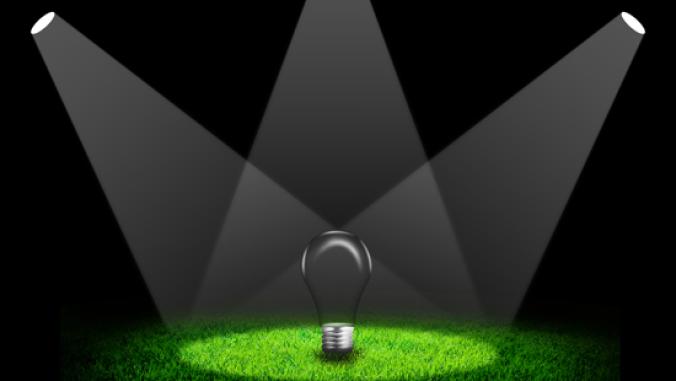ICYMI: World Water Day makes a splash, greener fracking and more
<p>Today marks World Water Day and tomorrow is Earth Hour (or Human Achievement Hour, if you're a crackpot).</p>

ICYMI -- "In Case You Missed It" -- is a regular Friday feature recapping the news of the week.
Greetings, readers, and happy World Water Day! I am celebrating by having only water to drink for the past 24 hours. Also, I'm writing to you from the depth of the Flu Zone, and water is all I can handle. As a result, please forgive brevity, typos, excessive rants and so on. Let's begin, shall we?
World Water Day
• Bad news first: Water, as we all know, is actually our most precious resource. Too bad that the American Society of Civil Engineers gave the U.S. water infrastructure -- you know, those pipes that bring us water on demand -- a grade of D, saying it will cost $1 trillion to fix the system. The good news: In 2009 the infrastructure received a D-minus.
• Dow is launching today H2OME, a web-based tool aimed at highlighting the water intensity of everyday items, from pots and pans to electronics. The company is also highlighting its water-saving efforts, including a new partnership with Ahlstrom to bring highly efficient, low-cost water purifiers to people with insufficient access to clean water.
• IBM today launches a new mobile app called "WaterWatcher," aimed at South Africa's water system. The majority of the country's population lacks access to water in their homes, and South Africa recently ranked 128 out 132 countries in the Yale Center for Environmental Law and Policy's 2012 Environmental Performance Index, gauging the world's water, air and overall environmental performance.
• ImagineH2O announced this week the winners of its fourth annual Innovations Prize, with awards going to companies creating products to solve a range of water issues, including Hydrosolutions' leak prevention alert system, PaveDrain's stormwater drainage system, Innogation's smart landscaping water efficiency technology, and DioHaiti for bringing water distribution to the bottom of the pyramid.
• Water-saving farming strategies: The Food Tank, a food-focused think tank, has released a list of 10 strategies for farmers, policymakers and individuals aimed at reducing water waste. Among the solutions: Farmers can embrace cover crops and intercropping, switch to perennials instead of annual crops, and harvest rainwater everywhere. And everyone can/should cut down on meat -- hello Meatless Monday (and Tuesday, and Wednesday, etc.)!
Odds and Sods
• Greener fracking: A study from USC finds that, if California embraced fracking in the oil-rich Monterey Shale, the state could see as much as a 14.3 percent growth in economic activity. I have thoughts about that, but this is not the place to air them. Instead, let's point to the just-launched Center for Sustainable Shale Development, a coalition of oil and gas firms, nonprofits and advocacy groups that aims to create a certification for environmentally responsible development of shale gas resources. While targeted at the Appalachian Basin (the CSSD is based in Pittsburgh), there's no reason that the 15 criteria included in the proposed standard wouldn't apply to California fracking as well.
• Smarter grids abroad, trouble at home: A new market forecast report from Memoori Business Research finds that Germany is making better progress than anyone else in using smart grid technologies to bring variable energy flow from renewable energy sources to the grid. The U.S., meanwhile, looks "doubtful" in its progress. (See above, regarding our massive, looming infrastructure debts.) Meanwhile, PG&E was named a top utility for smart grid implementation by Green Tech Media. Other winners include: Duke Energy, Sacramento Municipal Utility District, Oncor and Arizona Public Service.
• Taking energy efficiency to the next level: As the chart below shows, since the 1970s, the United States has made great progress in reducing our energy intensity, cutting our energy used per dollar of GDP by almost half.

But as a new report from the ACEEE shows, there is still plenty of room for improvement. The report highlights 16 policy changes that could save $1 trillion in energy costs -- thereby covering our water-infrastructure bill. How's that for an easy solution?
Earth Hour and Earth Day: Haters gonna hate
• Tomorrow, my friends, is Earth Hour. People are commemorating it -- celebrating it may be too strong a word -- by turning off lights for an hour, starting at 8:30 p.m. wherever you are. Organizations are supporting it. The Bay Lights are going dark for an hour (Bay Area residents: Go see the lights, just not tomorrow!). And of course the jokesters at the Competitive Enterprise Institute will be holding forth, once again, with Human Achievement Hour, in which one could celebrate the miraculous creations of humankind by leaving all the lights on in your home.
• Speaking of haters, Earth Day is coming up entirely too soon, judging by the flood of emails in my inbox already. I will admit to drinking a certain level of haterade for April 22 each year (we have some fun with it from time to time to time ...), but I have to say that this competition for a state-sponsored Earth Day poster competition in Utah takes the cake. The theme of said poster competition? "Where Would WE Be Without Oil, Gas & Mining?".
And with that, I bid you hasta luego, compadres. Don't let the bogeyman get you during Earth Hour ...
Photocollage by GreenBiz Group





